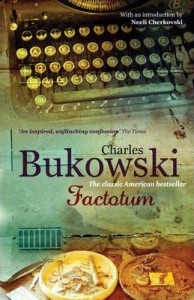 Factotum was on our book circle summer reading list, so it’s been a couple of weeks since I finished it, but it takes a while to get around to blogging, obviously.
Factotum was on our book circle summer reading list, so it’s been a couple of weeks since I finished it, but it takes a while to get around to blogging, obviously.
Factotum is surprisingly readable considering the synopsis is «Henry Chinansky travels around the US, being regularly hired and fired all the while constantly drinking and having quite a bit of sex.» I mean, really. That’s the plot.
As usual Carmen was wearing a very tight knitted dress that fit her like a balloon fits the trapped air, maybe tighter.
(Page 68) Much of the charm has to do with language, of course. There are little nuggets of beautifully formed thoughts throughout the book. I found it hard to pick just one or two for this blog entry, so you get a slew of them
He jumped up on the dusty seats, began walking along ripping out old posters with his can opener. So that’s how those things get up there, I thought. People put them there.
(Page 27) This is not life-changing literature. Well, not for me, anyway. But despite Henry hardly being the sort of person you’d trust with… well, anything, really, and despite having more than a little sympaty for his father who insists Henry pay rent and board while staying «at home» for a stretch in the book, it’s hard not to like him.
The problem, as it was in those days during the war, was overtime. Those in control always preferred to overwork a few men continually, instead of hiring more people so everyone might work less. You gave the boss eight hours, and he always asked for more. He never sent you home after six hours, for example. You might have time to think.
(Page 38) And though the hiring and firing gets a little repetitive, the insight it offers into the unskilled, odd-job market is interesting. Most of the time Henry is quite deservedly let go, but occasionally he is fired through no fault of his own, and those occasions serve to illustrate why, perhaps, he cares so little about trying to keep any job. He seems to think that sooner or later he’ll be fired anyway, so why bother actually doing a good job, and to some extent he may be right.
I always started a job with the feeling that I’d soon quit or be fired, and this gave me a relaxed manner that was mistaken for intelligence or some secret power.
(Page 99-100) If the book has a fault it’s that it sort of peters out at the end. Henry doesn’t get a job as a writer and get his act together, neither does he die in squalour of alchohol poisoning. There you are reading about Henry drinking and losing another job and then on the next page the book ends. No closure, so to say.
Still, I rather enjoyed it.